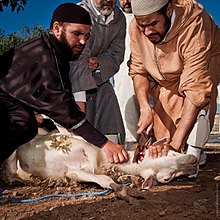Eid al-Adha
Islamic holiday on the tenth day of Dhu al-Hijjah
Eid al-Adha or the Holiday of Sacrifice is the second and the larger of the two main holidays celebrated in Islam. It honours the willingness of Abraham to sacrifice his son Ishmael as an act of obedience to God's command.

Quotes
edit- In traditional Muslim countries herders and farmers can sacrifice their own animals. Others may go to the marketplace, where an animal can be bought and sacrificed, though prices are often higher than normal,...
- Food, Feasts, and Faith: An Encyclopedia of Food Culture in world religions ... Paul Fieldhouse · 2017
- At this occasion, Muslims sacrifice animals like camels, cow, and small ruminants. Small ruminants are more in demand because of their price and cost of their feed ritual.
- Sustainable Goat Production in Adverse Environments: Volume ii ... João Simões, Carlos Gutiérrez · 2018
- It is the duty of every free Muslim arrived at the age of maturity to offer a sacrifice, on the ‘Idu’l-Azha’, or ‘Festival of the Sacrifice’, provided he be then possessed of a Nisab (i.e., sufficient property), and be not a traveller. This is the opinion of Abu Hanifah, Muhammad, Zufar, and Hasan, and likewise of Abu Yusuf, according to one tradition. According to ash-Shafi’i, sacrifice is not an indispensable duty, but only laudable. At-Tahawi reports that, in the opinion of Abu Hanifah, it is indispensable, whilst the disciples hold it to be in a strong degree laudable. The offering of a sacrifice is incumbent on a man on account of himself, and on account of his infant child. This is the opinion of Abu Hanifah in one tradition. In another he has said that it is not incumbent on a man to offer a sacrifice for his child...
- The Hidayah, quoted in Arun Shourie - The World of Fatwas Or The Sharia in Action (2012, Harper Collins)
- This is heartbreaking Animals don’t need to die for you to celebrate Eid al-Fitr. Have a #vegan holiday.
- Tweet by PETA, 2019, [1] Muslim Twitter Hit Back at PETA’s “Irresponsible” Eid Tweet
- PETA organises peaceful animal protection awareness programmes for Christmas, Easter, Diwali, Janmashtami and other holidays, as well as Eid…it is shameful that in working to stop violence, our volunteers were made to suffer violence.
- “I felt I was walking through a post-apocalyptic neighbourhood,” said Atish Saha, a Dhaka-based artist.“To be honest, I was scared. It was an image of mass violence that shouldn’t ever be experienced.” Particularly jarring was said to be the sight of families, including infants, wading into the flood in celebratory “Eid day” moods. “It made me speechless,” he said.
- Atish Saha, a Dhaka-based artist. Quoted in Rivers of blood flow on streets of Dhaka after Eid animal sacrifices, 2016